The Union Council of Ministers in responsible for day to day administration of the country & governance in general. But what are the rules that define & allocate work between departments? Here is a detailed explainer.
For every organization small or big to function effectively, certain rules & division of work are necessary. It holds true for the humungous task of governing the country as well. At the central level, the Union Council of Ministers is at the helm of governing the country, under the leadership of the Prime Minister. But how does this division of work take place? Here is an explainer.
What are the Constitutional Provisions?
The Constitution in article 74 recognizes the Union Council of Ministers with the Prime Minister (PM) as its head to aid & advise the President in discharging his executive functions, in short running the government. The President has to act in accordance with that advise.
In Article 77, the constitution notes that the President shall make rules for the transaction of the business of the Government of India, and for the allocation among Ministers for the transaction of such business. In other words, the exact distribution of work is made in those rules.
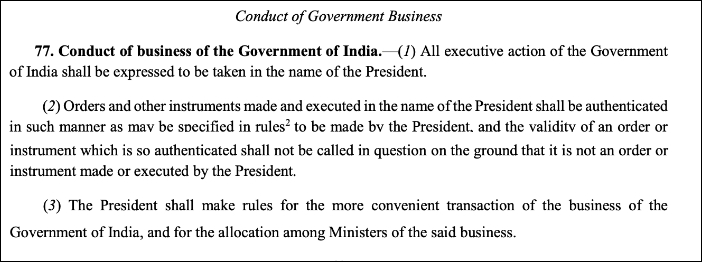
Accordingly, two sets of rules have been made and are continuously amended to accommodate new subjects or issues. The rules are
- Government of India (Allocation of Business) Rules, 1961 – These rules deal with the distribution of subjects among various ministries.
- The Government of India (Transaction of Business) Rules, 1961 – These rules define how the day-to-day transaction of business within the government should take place and what all ministries have to be contacted for different decisions etc.
These rules along with the ‘Manual of Office Procedures’ form the crux of documents based on which the Government of India functions.
What is the Cabinet Secretariat then?
As per the details on the official website, the Cabinet Secretariat functions directly under the Prime Minister and is responsible for the administration of the two sets of rules mentioned earlier. It is also responsible for facilitating smooth transaction of business in Ministries. The secretariat assists in decision-making in Government by ensuring Inter-Ministerial coordination, ironing out differences amongst Ministries/Departments and evolving consensus, management of major crisis situations in the country and coordinating activities of various ministries in such a situation etc.
The Allocation of Business
These rules clearly lay down that all the business of the Government of India shall be transacted in the Ministries, Departments, Secretariats, and Offices as specified in the rules. The first schedule of these rules has a detailed list of Ministries & the Departments within these ministries.
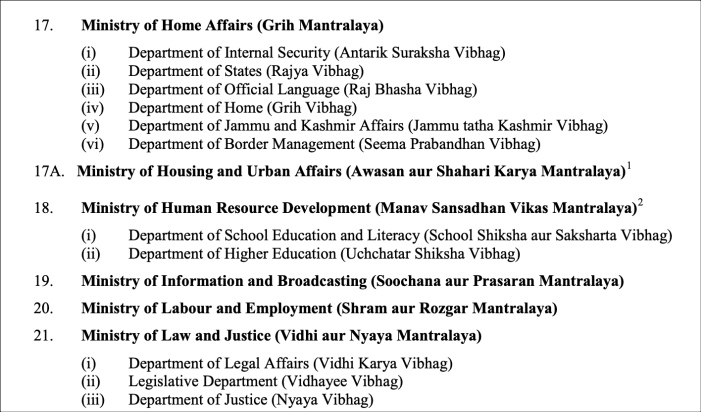
The second schedule of these rules deals with the distribution of subjects among these departments. It has to be noted that such distribution also includes all sub-ordinate offices, public sector undertakings related to that subject.
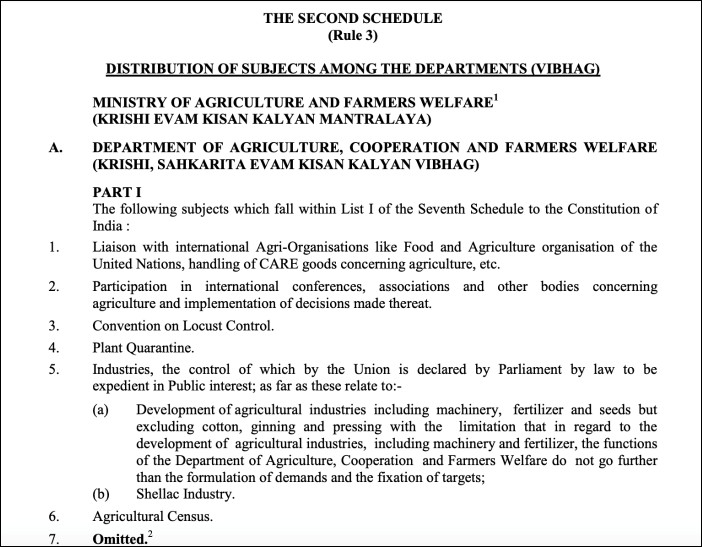
Among other things, the rules also specify the following
- Compiling of all the accounts of the department have to be done by the specific department
- Details of who has to accord the sanction of prosecution in the case of an offence committed by any government servant
- That all the business allocated to the Cabinet Secretariat is deemed to have been allotted to the Prime Minister.
The allocation rules are continuously amended to omit some outdated subjects, include or redistribute new ones etc. There have been close to 350 such amendments till April 2019.
What about the Transaction rules?
The Government of India (Transaction of Business) Rules, 1961, on the other hand, deal with how the day-to-day business of the government should be transacted. Among other things, these rules deal with when to consult other departments, what kind of cases are to be submitted to the PM, the cabinet & various cabinet committees.
Inter-Departmental Consultations: The rules mention that when the subject of a case concerns more than one department, no decision is to be taken until all concerned departments have concurred or in case of no concurrence, until such time the cabinet has taken a decision in the case. The rules also define that any case, in which if a decision is taken by one department and that decision is likely to affect the transaction of business allotted to another department, will be treated to be a case whose subject concerns with more than one department.
Concurrence of the Ministry of Finance: Except in cases where complete powers to sanction expenditure or to appropriate or re-appropriate funds, are made by the Ministry of Finance, no department can issue orders in the following matters without the concurrence of the Ministry of Finance. The matters concerned are
- involve any abandonment of revenue or involve any expenditure for which no provision has been made
- involve any grant of land or assignment of revenue or concession, grant, lease or licence of mineral or forest rights or a right to water power etc.
- relate to the number or grade of posts, or to the strength of a service, or to the pay or allowances of Government servants or to any other conditions of their service having financial implications
- otherwise have a financial bearing whether involving expenditure or not
Consultation with the Law Ministry: The rules mention that the Law Ministry has to be consulted in the following matters.
- proposals for legislation
- making of rules and orders of a general character in the exercise of a statutory power conferred on the Government
- the preparation of important contracts to be entered into by the Government.

Who can request papers from Ministries?
According to these rules, the following entities can call for papers from various departments.
- The Prime Minister may call for papers from any Department
- The Finance Minister may call for papers from any Department in which financial consideration is involved
- Any Minister may ask to see papers in any other Department if they are related to or required for the consideration of any case before him
What is the Cabinet?
The Union Council of Ministers is made up of the PM, the Cabinet ministers and the Ministers of State (MoS). However, the cabinet includes only those ministers of the cabinet rank. The Cabinet generally meets on a specific day of a week to take decision on all issues brought before it. The cases which shall be brought before the cabinet are defined in the 2nd schedule of the transaction rules.
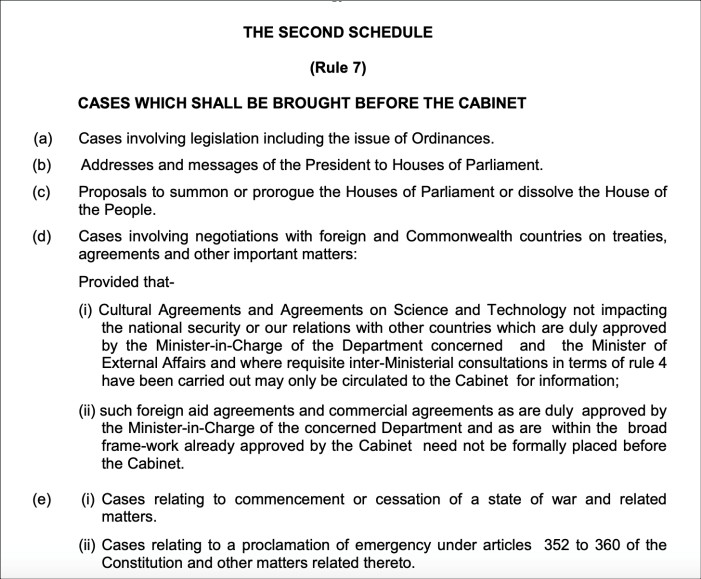
What are Cabinet Committees then?
In addition to the cabinet, there are standing committees of the cabinet commonly known as the cabinet committees. The PM has the authority to add or reduce the number of such committees and also has the power to specify which cabinet minister is part of these committees. As on date, there are 8 such committees. Each committee has members as well as special invitees. The following are the cabinet committees as on date.
- Appointments Committee of the Cabinet
- Cabinet Committee on Accommodation
- Cabinet Committee on Economic Affairs
- Cabinet Committee on Parliamentary Affairs
- Cabinet Committee on Political Affairs
- Cabinet Committee on Security
- Cabinet Committee on Investment and Growth
- Cabinet Committee on Employment and Skill Development
Each of these committees has defined functions as per the transaction of business rules.
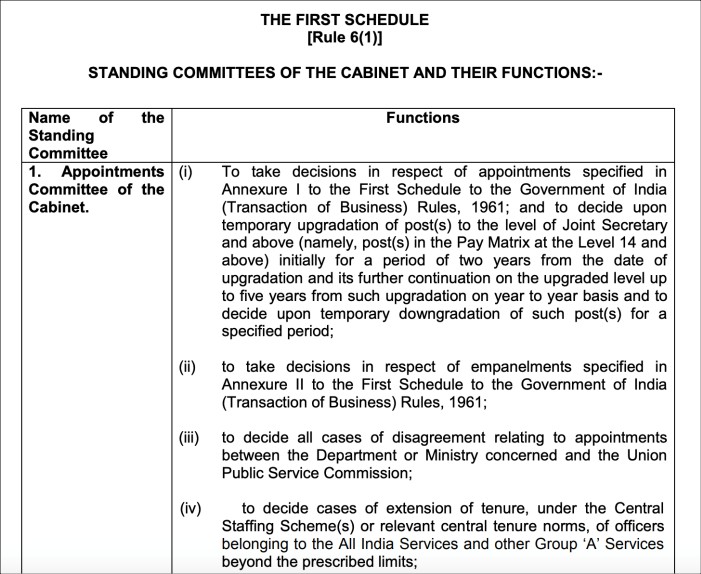
In addition to the specific functions defined in the rules, these committees have the power to consider and take decisions on matters referred to it by any Minister or by the Cabinet. There could also be ad-hoc committees like Group of Ministers (GoM) set up by the cabinet, the PM, or any of the cabinet committees.
What about the cases common to the Cabinet & the Cabinet Committees?
In case there is a commonality in the subjects of both the Cabinet Committees and the Cabinet, the Cabinet committees shall be competent to take a final decision except in cases where they are asked not to do so. It also has to be noted that no case which concerns more than one department can be brought before the cabinet committees unless all concerned departments have been consulted.
In addition to the above, the transaction of business rules also contains the list of cases that need to be submitted to the PM & the President, the type of reports to be submitted by departments to the Cabinet, responsibility of secretaries etc. Finally, the rules also mention that the PM may permit a departure from these rules to the extent he feels necessary.



1 Comment
This is great! However, differences between cabinet ministers and ministers of state and what do ministers of state do are some important details missing.